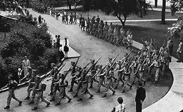In focus
Elizabeth Meyer: Protecting students from anti-gay bullies

Elizabeth Meyer, a PhD candidate with McGill's Department of Integrated Studies in Education.
Kate Hutchinson
As a former high school teacher in the U.S. and France, Elizabeth Meyer has witnessed first-hand how students can use homophobic slurs to harass their peers.
Regardless of whether the victims are gay or actually straight, labels such as "fag" or "dyke" remain preferred verbal weapons among school bullies. But when gay, lesbian, bisexual and transgender (GLBT) students turned to Meyer for help in the past, she found little information on how to help them.
"GLBT kids were clearly having a hard time and someone needed to defend them," recalls Meyer, who is completing a doctorate in McGill's Department of Integrated Studies in Education.
Meyer didn't find teaching colleagues helpful, either. Indeed, most were unsupportive when she sought ways to stop homophobic behaviour. But she was stunned when her teaching contract was revoked after she wrote an article in a teacher's newsletter in upstate New York, suggesting ways to support GLBT youth and other victims of harassment.
"I became a victim of anti-gay sentiment myself for advocating for the rights of students who were being targeted," she recalls.
Meyer is now fighting back by educating others. Earlier this month, she presented findings of 10 major studies on anti-gay harassment that she compiled from the past five years to American Educational Research Association's annual meeting in Montreal.
"Students are being violently and repeatedly harassed in schools with anti-gay comments, jokes and behaviours," Meyer warned fellow educators, noting teachers often turn blind eyes and deaf ears to the poisonous teasing of students. "All students suffer when prejudices go unchecked. By accepting such antisocial behaviours, educators send the message that prejudices are appropriate to our culture.
"Educators need to set aside their personal prejudices and fears to effectively support all students," she says, noting teachers need training to properly address anti-gay harassment.
Shaheen Shariff, Meyer's graduate supervisor and an expert on student bullying, agrees educators have a responsibility to stop anti-gay harassment. "Society has changed," she says, "and teachers need to provide a learning environment that is respectful and inclusive of all students.
"Educators, policy-makers and the public often associate bullying with behavioural problems," Shariff says. "But bullying is harassment and it can lead to the systemic oppression of GLBT students."
Courts have concurred that uttering anti-gay slurs is harassment. Meyer analyzed three groundbreaking legal cases where students sued their school boards for not protecting them from undue harassment. In all three cases, two in the U.S. and one in Canada, the students won.
"It was the high price of those settlements that forced school boards to pay attention to the rights of sexual minorities in their schools," she says.
Only 10 U.S. states have non-discrimination policies that make sexual orientation a protected class, reports Meyer. In Canada, all provinces and territories explicitly include sexual orientation in their human rights legislation, while sexual orientation is protected under the Canadian Charter of Rights and Freedoms.
"But laws or anti-harassment policies are meaningless unless they are enforced," stresses Meyer.
Despite an apparent increase in acceptance of homosexuals in North America, many problems remain. Meyer found that boys remain twice as likely as girls to report being called "gay."
Using data from the 2003 National School Climate Survey — prepared by the Gay, Lesbian and Straight Education Network — Meyer discovered that 84 percent of GLBT students report being verbally harassed, 64.3 percent report feeling unsafe at school, 39.1 percent report being physically harassed and 83 percent report teachers rarely or never intervene when homophobic remarks are made.
To those who would argue that all students are bullied at some point, Meyer counters, "Homophobic harassment is emotionally damaging to GLBT youth or any student who is perceived to be different."
— Sylvain-Jacques Desjardins
 |
||||
|
"We are getting a tremendous amount of requests from the states for prevention information. They call and say, 'I am a counselor in a school, there are a lot of kids playing poker. Help!'" Rina Gupta, Co-director of International Centre for Youth Gambling Problems and High Risk Behaviour, quoted in the New York Daily News on internet poker. |
||||
McGill's WWII on the web

Drills on lower campus, from R.C. Fetherstonhaugh's McGill At War.
McGill 1942: Students lounging on the Lower Field idly watch men in Canadian Army uniforms perform precision drills. A sergeant barks orders. The ground thuds with the sound of 100 booted feet stamping the earth in perfect unison. The drill finishes, and the soldiers relax. Seen individually, they are young — 18, 19 and 20 years old. Some sit on the grass with the civilian onlookers, others head into the Arts Building to speak to their professors. Each is a McGill student — only a few of the 5,568 men and women from this university who served in World War II.
Of that number, 298 were to die in service, either killed in action or through illness or injury. They are listed on a new website called McGill Remembers, which honours the memory of those students, graduates and staff. The site is the product of the passion of integrated studies in education professor Chris Milligan and Wes Cross from the Dean of Students Office.
Milligan had already written a book on the sinking of a Australian hospital ship in WWII. The McGill Remembers site initially started as an attempt to catalogue the history of former Montreal high schools. Looking through yearbooks from the '40s set him on the course that would lead to the McGill website.
"I'd look through these books and there would be 20 pages of chaps in uniform who had died, and my interest was piqued," he said.
Creating a national WWII memory project for Canadian high schools proved unfeasible, so Milligan turned to McGill.
The main source on McGill during the wars is R.C. Fetherstonhaugh's McGill University at War, published in 1947. With the 60th anniversary of the end of the war occurring this year (Victory Europe day is May 8) the time seemed right to make the contents of the book — especially the lists of those who perished — available on the web.
The site is much more than that. Each name shows the corresponding page in the Veterans Affairs Canada Books of Remembrance, on display in the Parliament Buildings in Ottawa, as well as the appropriate entry in the Commonwealth War Grave Commission's website. There are also photos from McGill, and Cross scanned in newspaper stories from the day Germany's capitulation was announced.
"Most interesting for us was that the U.S. Navy named a destroyer after a McGill graduate, and most people had forgotten that, said Cross.
The vessel — the U.S.S Begor — was named after a medical graduate who died in Guam. The website has its history, and an image of a plaque the university presented to the vessel in honour of the McGill graduates who were serving in the U.S. armed forces.
Both Milligan and Cross hope that more information will be made available, and the project can become part of an official university web memorial. They also plan to construct a similar site on McGill's part in the First World War.
"It's a labour of love," said Cross. "It's very interesting to see the names of those who walked the same corridors and hallways and avenues that we did."
Check out the site at http://www.education.mcgill.ca/ww2fields/mcgill.
— Mark Reynolds
 |
||||
|
[There is] increasing evidence that depression has an impact on every body system and organ... Over time, depression prematurely ages you. |
||||
